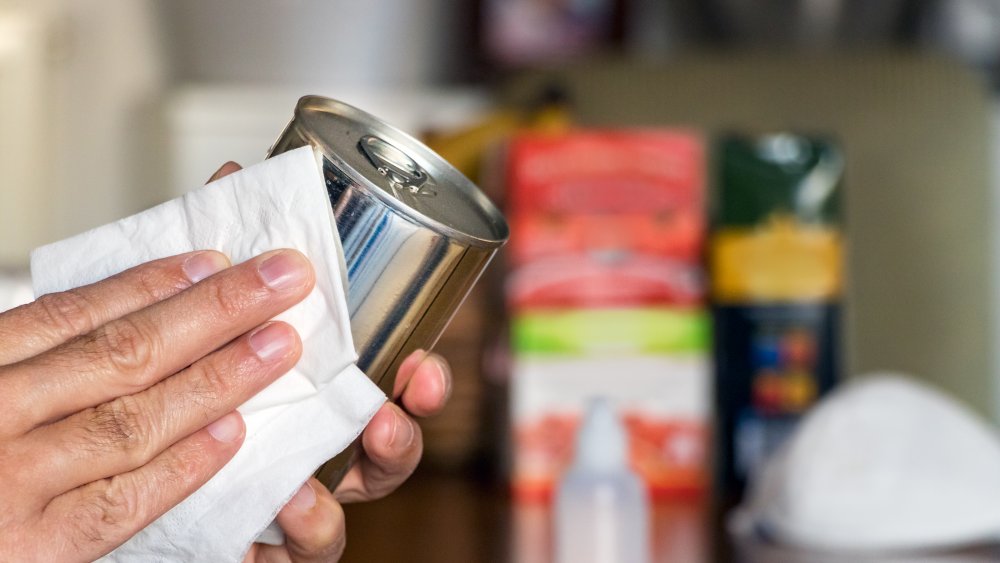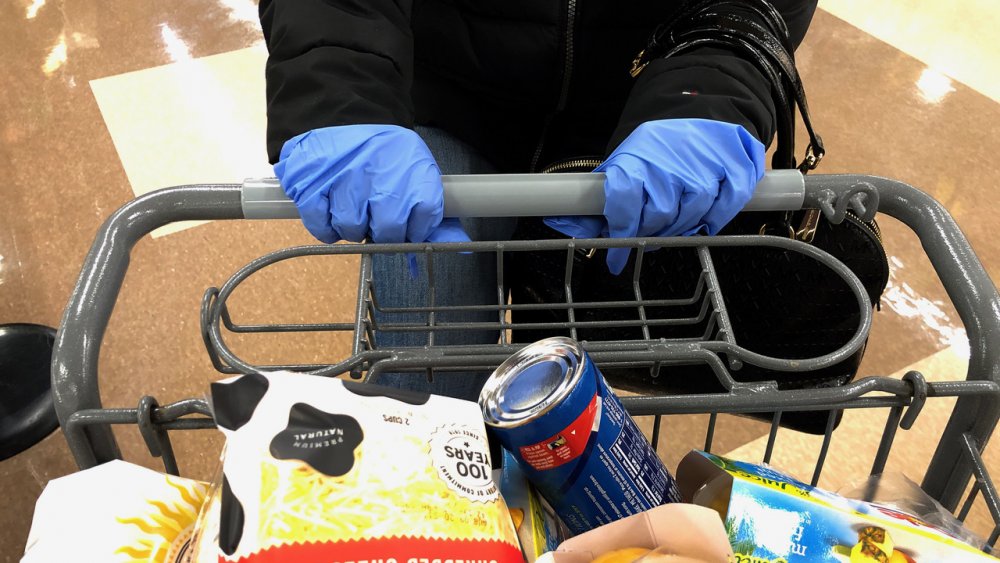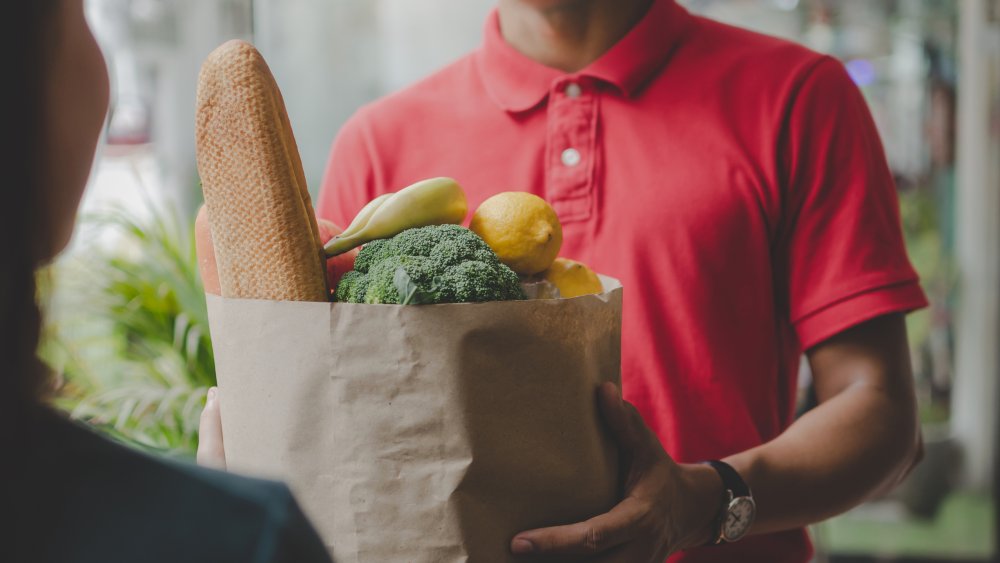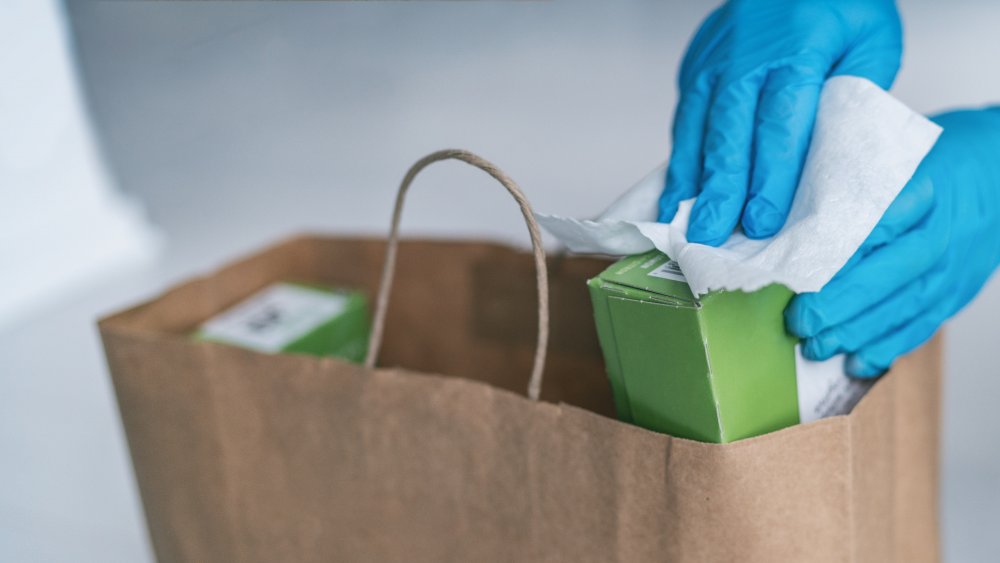The Truth About Sanitizing Your Groceries
Sanitize your hands, sanitize your kids, sanitize your pets, sanitize... your groceries? At no other time in recent history have groceries dominated so many headlines. Major media outlets are talking about everything from grocery shortages, to grocery delivery to grocery workers and how to grocery shop safely.
What about when you get those groceries home though? The opinions on whether or not you should sanitize your groceries are somewhat mixed — even among health experts. One video made by physician Dr. Jeffrey VanWingen that advised washing fruits and vegetables with soapy water took the internet by storm and racked up millions of views (via LiveScience). Benjamin Chapman, a professor and food safety specialist, saw things differently, though, and said that the risk of an upset stomach from ingesting soap wasn't worth it and advised against VanWingen's recommendation.
VanWingen also advised that people keep their groceries in the garage for several days in case the virus was on the packaging. Chapman also disagreed with this, saying, "We don't have any evidence that food or food packaging are transmission vehicles for coronavirus." Hold up! The National Institutes of Health says on their website that because SARS-CoV-2 — the virus that causes COVID-19 — can live on cardboard for up to 24 hours, people could contract it through touching "contaminated objects." Gah, who do we believe?!
There's likely little risk of transmission through food packaging
So does this mean we should spray everything we buy with Lysol and throw those potentially deadly cardboard boxes in the trash before they can pass along COVID-19? Infectious disease expert with the very fancy title of Chair and President of ACCESS Health International, Dr. William Haseltine, told People that food packaging poses little risk of virus transmission and sanitizing your groceries might be "a little too much."
The USDA says that so far, they're "not aware of any reports at this time of human illnesses that suggest COVID-19 can be transmitted by food or food packaging." That's somewhat reassuring except for those words "so far." It's always a good idea to wash your produce when you get it home, though, especially in these strange times.
Food microbiologist Donald Schaffner agreed with his colleagues that there's no evidence COVID-19 is spreading through food or food packaging (via Vox). Taking the extra step to clean your groceries just isn't necessary, in his opinion. "I am not recommending disinfecting your groceries," Schaffner said before adding, "This seems like being overly cautious."
Safe shopping will go a long way
The downside is that while most experts agree there's little chance of transmission through food or food packaging, there's still a lot to learn about the virus. While Schaffner believes that food transmission of coronavirus is unlikely, he told The Guardian, "That doesn't mean we might not learn new evidence tomorrow that would change our thoughts on that."
Probably the safest measure, for now, is to practice proper safe shopping at the grocery store or while getting food takeout/delivery (via Consumer Reports). The safest thing is to avoid close contact with others and to do your best to keep that social distance of six feet at all times. And again, wash those hands! If you can avoid using cash that's also probably a good idea. Cash has always been a haven for germs and if you can pay with your card or through a phone app, all the better (via Time).
So while most experts say that sanitizing your groceries isn't believed to be necessary at this point, what if you do want to be overly cautious — just in case?
How to safely sanitize your food
Dr. Haseltine suggests if "you're really worried about that, wear gloves when you open the packages." You may also want to place any grocery or food delivery bags on the floor or in the sink rather than on your countertops when unloading them. It's also not going to hurt to transfer your food from the delivery containers it came in to your plate before chowing down. And, as always, wash your hands thoroughly after doing this.
Out of an abundance of caution, NBC consumer correspondent Vicky Nguyen suggests using disinfecting wipes to clean boxes, bottles, and other food packaging before putting them away (via Today). When it comes to fruits and vegetables, don't use disinfecting wipes, though, as their chemicals could make you sick.
The main takeaway here is that while sanitizing your groceries isn't necessary at this time, washing your hands frequently and disinfecting surfaces in your home is your best precaution against transmission.



